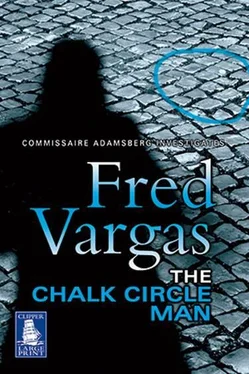Mathilde looked from one to the other in consternation. Adamsberg waited for it to sink in. He knew it would take time, and that she would not want to believe it.
‘No, that can’t be it,’ said Mathilde. ‘She’d never have had the physical strength. Remember what a skinny little thing she is?’
‘There are plenty of ways to get round that,’ said Danglard. ‘You could pretend to be ill, sitting on the pavement and wait for someone to bend down, then hit them on the head. All the victims had been knocked unconscious first, remember, Mathilde.’
‘Yes, I remember,’ said Mathilde, distractedly running her fingers through strands of her dark hair as it fell over her forehead. ‘But what about the doctor? How did she catch him?’
‘Very simple. She must have arranged to meet him in a certain place.’
‘Why would he come?’
‘Oh, he would. Someone from your past suddenly calls on your help. You forget, you drop everything and you come running.’
‘Yes, of course, you must be right,’ said Mathilde.
‘The nights of the murders. Was she home? Can you remember?’
‘Well, she used to go out just about every night, for these so-called rendezvous, like the other night. Oh damn it all, that was some act she was putting on for me. Why don’t you say anything, commissaire ?’
‘I’m trying to think.’
‘ To any purpose?’
‘No. I’m getting nowhere. But I’m used to that.’
Mathilde and Danglard exchanged glances, both looking disappointed. But Danglard was no longer in a mood to criticise Adamsberg. Yes, Clémence had vanished. But all the same, it was Adamsberg who had understood that something wasn’t right and had sent Danglard off to Marcilly.
Adamsberg got up without warning, made a nonchalant pointless gesture, thanked Mathilde for the coffee and asked Danglard to have the technical team come and check Clémence Valmont’s apartment.
‘I’m going for a walk,’ he said, so as not to leave without saying anything. Any excuse so as not to hurt their feelings.
Danglard stayed for a while with Mathilde. They couldn’t stop talking about Clémence, trying to understand. The fiancé who abandons you, the cruel procession of lonely-hearts advertisements, neurotic feelings, little pointed teeth, bad impressions, ambiguities. From time to time, Danglard would get up and see how the technicians were getting on upstairs, and come back saying: ‘They’re in the bathroom now.’ Mathilde poured out some more coffee after adding hot water to the pot. Danglard felt comfortable. He would gladly have stayed there for ever with his elbows on the table with its fish swimming under the glass, lit up by Queen Mathilde’s dark-skinned face. She asked him about Adamsberg. How had he guessed all this?
‘No idea,’ said Danglard. ‘And yet I’ve watched him working, or rather not working. He sometimes seems so casual and offhand that you’d think he’d never been a policeman, then at other times his face is all tense and screwed up, so preoccupied that he doesn’t hear a thing you say. But preoccupied by what? That’s the question.’
‘He doesn’t look as if he’s satisfied,’ Mathilde remarked.
‘No, that’s true. Because Clémence has done a runner.’
‘No, Danglard. I think he’s worried about something else.’
One of the technicians, Leclerc, came into the room.
‘About the prints, inspecteur . None at all. She must have wiped everything, unless she was wearing gloves the whole time. Never seen anything like it. But in the bathroom, I found a drop of dried blood on the wall, down behind the washbasin.’
Danglard ran upstairs behind him.
‘She must have washed something. Maybe the rubber gloves, before throwing them away. We didn’t find any near Delphine’s body. Get it analysed, fast as you can, Leclerc. If it’s blood from Madame Le Nermord, that pins it on Clémence once and for all.’
A few hours later, analysis had confirmed that the blood was that of Delphine Le Nermord. A wanted notice went out for Clémence.
On hearing the news, Adamsberg remained depressed. Danglard thought about the three things that had been on Adamsberg’s mind. Number one was Dr Pontieux. Well, that was resolved now. That left the fashion magazine. And the smell of rotten apples. He was certainly fretting about the rotten apples. But what point was there in that now? Danglard reflected that Adamsberg had found a different method from his own for making himself unhappy. In spite of his casual manner, Adamsberg had discovered an effective way of stopping himself finding any rest.
Most of the time, the door between the commissaire ‘s office and Danglard’s remained open. Adamsberg didn’t need to isolate himself to be alone. So Danglard came and went, put down files, read him a report, went off again or sat down for a brief chat. And now, more often since Clémence’s disappearance, Adamsberg didn’t seem receptive to anything, but carried on reading without looking up. Not that this hurt Danglard’s feelings, since it was obviously unintentional. It was more a kind of absence than a lack of attention, Danglard thought. Because Adamsberg did pay attention. But to what? He had an odd way of reading too, usually standing up, gripping his arms by the elbows and peering down at notes on the table. He could stay like that for hours on end. Danglard, who was aware all day of his body feeling weary and of his legs being unwilling to carry him, wondered how he managed it.
Just then, Adamsberg was standing up, looking at a little notebook with blank pages, open on his desk.
‘Sixteen days now,’ said Danglard, sitting down.
‘Yes,’ said Adamsberg.
This time he looked up at Danglard. It was true that there was nothing to read in the notebook.
‘It’s not normal,’ Danglard went on. ‘We should have found her by now. She’s got to go out, to eat and drink, she must sleep somewhere. And her description’s all over the papers. She can’t possibly escape. Especially looking the way she does. But there we are. She’s managed it somehow.’
‘Yes,’ said Adamsberg, ‘she’s managed it. There’s something wrong somewhere.’
‘I wouldn’t put it like that,’ said Danglard. ‘I’d say we’ve taken too long to find her, but we will in the end. She’s good at keeping a low profile, the old trout. In Neuilly, nobody seems to have known much about her. What do the neighbours say? That she didn’t bother anyone, that she was independent, funny-looking, always with her little beret on, and addicted to the lonely-hearts ads. Nothing else. She lived there for twenty years, for heaven’s sake, and nobody knows whether she had any friends, nobody knows whether she had another hideaway, and nobody remembers just when she left there. Apparently she never went on holiday. There are people like that who go through life without anyone else taking any notice of them. It’s not so strange that she ended up murdering someone. But it’s only a matter of time. We’ll find her.’
‘No, there’s something wrong here somewhere.’
‘What do you mean?’
‘That’s just what I’m trying to puzzle out.’
Discouraged, Danglard pulled himself heavily to his feet in three stages – trunk, buttocks, legs – and paced round the room.
‘I’d like to try to know what you ‘re trying to know,’ he said.
‘By the way, Danglard, the lab can have the fashion magazine back now. I’ve finished.’
‘You’ve finished what?’
Danglard was anxious to get back to his office, and anxious about this discussion which he knew would lead nowhere, but he couldn’t prevent himself thinking that Adamsberg had some idea, perhaps some hypothesis, and that alerted his curiosity, even though he suspected that whatever it was had not yet become clear to Adamsberg himself.
Читать дальше












